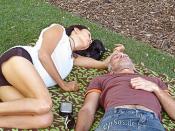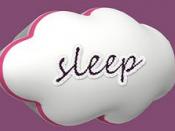Narcolepsy- A disabling neurological disorder of sleep regulation that affects the control of sleep and wakefulness. It may be described as an intrusion of the dreaming state of sleep REM into the waking state.
-Symptoms generally begin between the ages of 15 and 30.
-Symptoms of the disorder: excessive daytime sleepiness; cataplexy (brief episodes of muscle weakness brought on by strong emotions) sleep paralysis (paralysis upon falling asleep or waking up) and hypnagogic hallucinations (vivid dream-like images that occur at sleep onset).
-Patients with the disorder experience irresistible sleep attacks, throughout the day, which can last for 30 seconds to more than 30 minutes
-genetic component to the disorder
-Treatment: there is no cure, however, the symptoms can be controlled with behavioral and medical therapy.
Sleep Apnea- a serious, potentially life-threatening condition.
-breathing disorder characterized by brief interruptions of breathing during sleep; brain fails to send the appropriate signals to the breathing muscles to initiate respirations.
- On a given night, the number of involuntary breathing pauses may be as high as 20 to 60 per hour.
-These breathing pauses accompanied by snoring.
-The frequent interruptions of deep, restorative sleep often leads to excessive daytime sleepiness and early morning headache.
-Early recognition and treatment of sleep apnea is important because it may be associated with irregular heartbeat, high blood pressure, heart attack, and stroke.
- occurs in all age groups and both sexes but is more common in men. Sleep apnea runs in families, suggesting a possible genetic basis
- Symptoms: depression, irritability, sexual dysfunction, learning and memory difficulties, and falling asleep. Risk for heart attack and stroke may also increase in those with sleep apnea
-Medications are generally not effective in the treatment of sleep apnea. Oxygen is sometimes used in patients with central apnea caused by heart...


